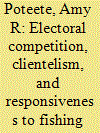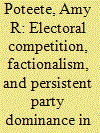| Srl | Item |
| 1 |
ID:
169770


|
|
|
|
|
| Summary/Abstract |
Political clientelism is generally seen as an obstacle to democratic governance and inclusive development. The politics of access to Senegalese fisheries suggest a more nuanced relationship between elections, clientelism, responsiveness, and inclusion. Even where clientelism is pervasive, it takes different forms and interacts with electoral competition to influence the direction and form of political responsiveness. When elections are highly uncompetitive or when electoral turnover is highly likely, elections do little to constrain incumbents or discourage elite resource-grabbing. When electoral competition renders outcomes uncertain, however, politicians face incentives to court potentially influential blocks of voters with promises of decentralized clientelism. This article traces connections between the intensity of electoral competition and the politics of access to Senegalese coastal fisheries since the 1990s, focusing on the period before and after Senegal’s second electoral turnover in 2012. It argues that, while electoral competition may not reduce the prevalence of clientelism, it can influence whether national elites or ordinary voters are the main beneficiaries.
|
|
|
|
|
|
|
|
|
|
|
|
|
|
|
|
| 2 |
ID:
111609


|
|
|
|
|
| Publication |
2012.
|
| Summary/Abstract |
The Botswana Democratic Party (BDP) has maintained a super-majority in the National Assembly for over forty years despite increasingly competitive elections. Several factors contribute to the BDP's continued legislative dominance, including features of the electoral system, fragmentation of the party system, and obstacles to strategic voting behaviour. Factional competition has played a particularly important role. Botswana's political institutions encourage factional competition, and factionalism interacts with the electoral system to hinder consolidation of the party system. Botswana's experience underlines the importance of internal party dynamics and their interaction with features of the electoral and party system in enabling the persistence of legislative dominance in competitive electoral systems.
|
|
|
|
|
|
|
|
|
|
|
|
|
|
|
|